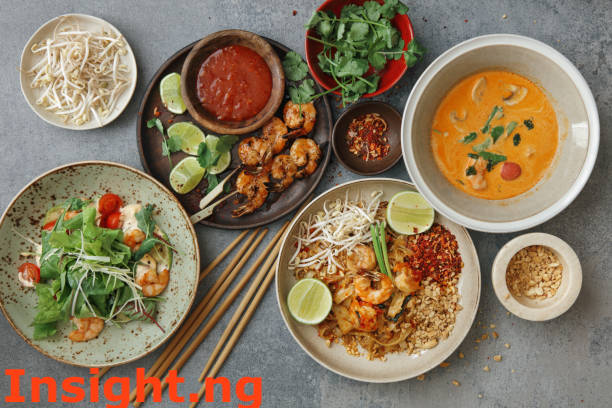Often, we want to eat what we feel like eating at any point in time, and if that is not feasible, we want to eat at the very least whatever is available without considering what time of the day it is.
After a hard day’s job, you entered your kitchen to make yourself a bowl of semo with correct egusi soup and all sorts of assorted beef or eba and ogbono soup with assorted stock fish and meats. Wait! Before you sit down to consume that meal, let’s consider some things first.
Food as an essential part of human survival, can be quite nutritious and very enjoyable. Food goes a long way to affect one’s health, mood, strength, and demeanour. Little wonder Virginia Woolf stated, “one cannot think well, love well, sleep well if one has not dined well”.
However, as good and nutritious as food is to the taste bud, body, and health of men or women as the case may be, it is important to know what sort of food to eat at what time of the day and what sort to avoid at what time of the day.
As the saying goes, “you are what you eat”. The kind of food you eat at a particular time of the day may, along with other factors, determine the effect it has on your health, size, weight, and functionality.
It is therefore important to create a habit of eating the right food at the right time. As Horace said, “Healthy eating is a way of life so it’s important to establish routines that are simple, realistic and ultimately liveable”.
Eating late at night has long been associated with weight gain, indigestion, acid reflux, and negative effect on blood sugar management and blood pressure. Therefore, establishing a routine is important to avoid eating late at night and the long-term health issues that late-night eating may cause.
Table of Contents
9 Foods to Avoid Eating at Night
-
Pounded yam
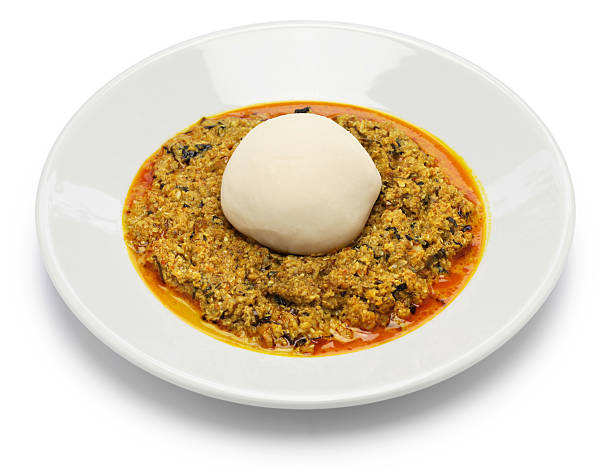
egusi soup and pounded yam, nigerian cuisine
The first on my list of food to avoid eating at night is pounded yam. Pounded yam is one of the best staple foods in Nigeria. It is a native food common to the Igbo, Ekiti, Ondo, Ijesha, Ebira, Tiv and Edo people. It is usually prepared by boiling the yam and afterwards pounding the boiled yam in a mortar and pestle. It is often eaten with a variety of soups such as egusi soup, gbegiri and ewedu soup, vegetable soup, okra soup, ofe nsala and ogbona soup. It is a highly nutritious food as it contains a variety of nutrients such as carbohydrate, vitamins, phosphorus, calcium, fibre, manganese, copper and many more. It is delicious and often regarded as the king of food.
Most people have little or no time to prepare and eat this kind of food during the day. It is then scheduled as a dinner when they would have more time to prepare and savour every bite of the delicious and nutritious taste of the food.
However, despite its nutritious and delicious taste, it is advised to avoid eating this at night. This is because of its heavy nature and the number of hours it takes to digest. Pounded yam weighs on your stomach, especially when eaten shortly before going to bed.
Pounded yam is best eaten in the morning, afternoon, or early in the evening. You should avoid eating it at night. According to American nutritionist and writer Adele Davis, we are expected to “eat breakfast like a king, lunch like a prince and dinner like a pauper”.
-
Akpu/Fufu
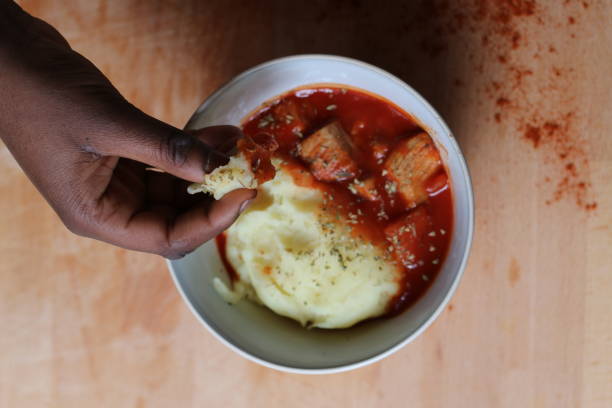
African dish from Ghana, casserole with beef, tomato and foufou, fufu
Akpu is another staple food that you should avoid eating at night. It is a thick sticky dough extracted from fermented cassava tubers and plantain flour. It is eaten across Nigeria and is often served with a variety of traditional soups such as vegetable soup, egusi soup, bitter leaf soup, groundnut soup, utazi soup, ogbona soup, and afang soup.
It is rich in nutrients such as iron, fibre, fat, calcium, and a high amount of carbohydrates and potassium. It has about 267 calories per serving. It is highly nutritious and can be eaten any time of the day other than at night.
It is best to avoid eating Akpu/fufu at night because it classifies as one of the heavy foods with high carbohydrate content which gets broken down into glucose and provides an immediate source of energy. When this glucose is not used, it turns to excess glucose that gets stored as glycogen in the liver or processed as fatty acids, which are then distributed throughout the body and stored as fat. In the long run, this could cause various diseases such as fatty liver and type 2 diabetes.
It is important to avoid eating Akpu/fufu at night to avoid overworking the digestive system and getting the carbohydrate stored as fat. Eating this food during the day when the body is still active and with controlled portions is better.
-
Eba
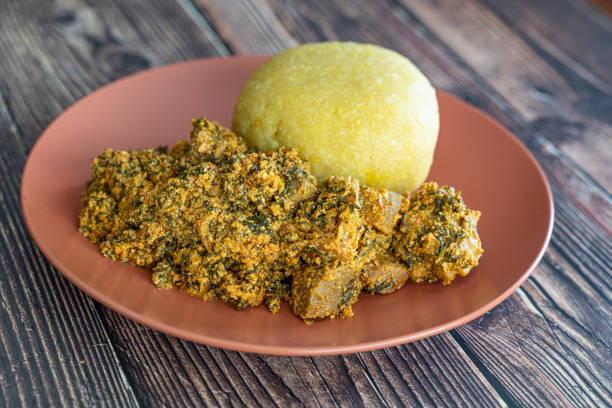
Nigerian Egusi Mellon soup with okele of garri
Another food to avoid eating at night is Eba. Eba is another basic food eaten by mainly the Yoruba and Igbo people. It is made from dried grated cassava flour, commonly known as garri. Eba can be made by spreading white or yellow garri ( garri mixed with palm oil) into a bowl of hot water and turning it thoroughly with a spatula until it blends nicely into a fine dough.
Eba is mostly served with different types of conventional soups depending on the region and the individual’s preference. It can be served with Edikang ikong soup, bitter leaf soup, gbegiri and ewedu soup, ogbona soup, okra soup, vegetable soup, and egusi soup.
Eba is another heavy food that has a gross energy content of 381.5 kcal. This is higher than other cassava products like fufu with 180 kcal and lafun with 357.7 kcal. Eba is one of the foods you should avoid eating at night because of its high carbohydrate, high-calorie, and acidic nature. It also takes a longer time to digest. This may cause the body to be restless, especially when taken shortly before going to bed.
It is best to eat this food during the early part of the day and in a controlled portion.
-
Amala
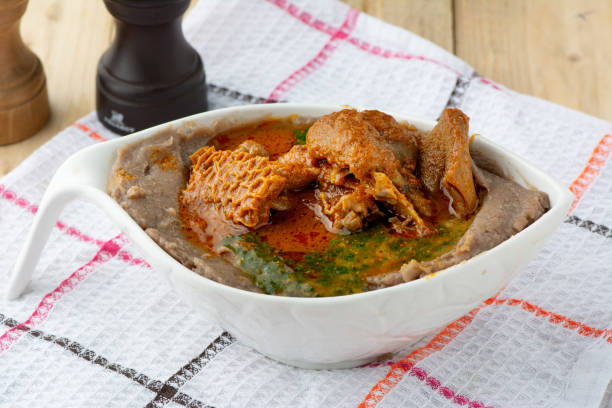
Nigerian dish, amala served with ewedu and assorted meat isolated on a tablecloth and on a table
Amala is another food choice to avoid eating at night. Amala is an indigenous food common to the Yoruba people. It is made from peeled and cleaned yam/cassava/plantain that is left to sun dry and then grounded into powder. It is often called elubo.
Amala can be in three forms, namely amala isu: the kind made from dried yam;
Amala lafun: the amala made from cassava;
Amala ogede: Amala made from plaintain.
Amala, when paired with gbegiri and ewedu soup with assorted beef, tastes super delicious. It can also be served with other soups such as vegetable soup, ogbona soup, and okra soup.
Amala is high in nutritional value. It is rich in dietary fibre, vitamins, carbohydrate which supply the body with lots of health benefits. It is known to help manage diabetes, aid digestion, and prevent constipation.
Although Amala does not have as much high content of carbohydrate as Eba/Akpu, it is best to avoid eating it at night because of the high water content it has. It increases trips to the restroom, thereby disrupting your sleep pattern. For maximum satisfaction, It can be enjoyed early in the evening.
Read also: Owambe Party in Nigeria: Foods, Vibes, Dressing and Cruise
-
Fried food
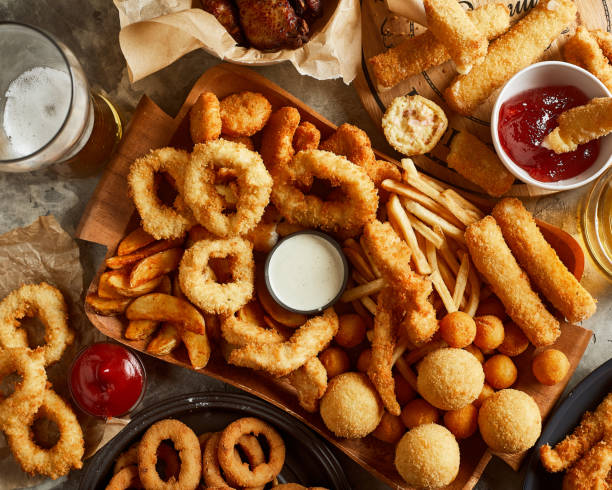
Fried foods
Another item on the list of food to avoid eating at night are fried foods. Fried foods are a variety of foods that have gone through the process of frying. This could range from peeled, sliced and fried potatoes, yams, plantains often known as French fries, or grounded beans known as Akara. Pastries such as puff puff, Samosa, minced pie, doughnut, sausage roll, egg rolls, cakes, sandwich, pizza, to mention a few, and other fried foods such as fish, chicken, turkey, and beef are not left out.
According to Kayla McDowell, “fried foods are significantly higher in fat and calories than their non-fried counterparts. For example, one small baked potato (100 grams) contains 93 calories and 0 grams of fat, while the same amount (100 grams) of french fries contains 319 calories and 17 grams of fat.”
Trans fats formed when unsaturated fats undergo a process called hydrogenation (when oil is heated to a very high temperature in the process of cooking) have been associated with increased risks of diseases such as cancer, heart disease, diabetes, and obesity.
Fried foods take longer hours to break down as a result of the artificial trans fats they contain. They should generally be avoided and most especially at night.
-
Carbonated drinks

Plastic bottles of assorted carbonated soft drinks in variety of colors
Carbonated drinks are another item on the list of food to avoid eating at night. Carbonated drinks are drinks that contain dissolved carbon dioxide. They include Coca-cola, commonly referred to as Coke, Fanta, Sprite, Seven up, Schwepp, Pepsi, Malt, Bigi cola, soda and many others. They contain a high amount of sugar, calories, and caffeine, which provide little or no nutritional value.
Although carbonated drinks help in spiking the sugar level of people with low blood sugar.
However, when consumed in excess, these drinks can lead to many health complications. Some of which include cavities, tooth decay, increased body mass index, belly fat, high cholesterol, cancer, Gout, increased blood sugar, which could eventually lead to diabetes and obesity.
Adding a bottle of carbonated drink to a meal increases your sugar and energy intake and contributes to your calorie intake. Instead of reaching for that bottle of coke, a warm cup of milk would be a healthier choice.
Carbonated drinks should be avoided at night and should also be taken in a reduced quantity during the day.
Are you learning something new? Would you like to take a chance on your business with collaboration? Sponsor your business with us today to reach a wider audience. Also, subscribe to our newsletter for firsthand updates on entrepreneurial webinars and workshops.
-
Caffeinated foods and drinks
Another food to avoid eating at night is caffeinated foods and drinks. Caffeine is a natural chemical found in the leaves and seeds of over 60 plants. It can be found in numerous plant foods and drinks.
Caffeine can also be manufactured and added to food, medicine and drinks. According to Daisy Whitbread, “synthetic supplemental forms of caffeine are also produced and added to foods”.
Caffeine is known for stimulating the central nervous system, muscles, heart, and other parts of the body that help control blood pressure.
Due to its stimulating and addictive qualities, many manufacturers add a quantity of caffeine content into their products. Some of the foods and drinks with high caffeinated properties include coffee, chocolates, chocolate cakes, energy drinks, green tea, black tea, sodas, and cola nuts.
Caffeinated foods and drinks, when consumed within six hours of bedtime, may give a temporary boost of energy which may eventually have a negative impact on the quality and duration of sleep. Except when trying to stay awake, it is advisable to avoid taking coffee or caffeinated food and drinks late at night in order to avoid sleep deprivation and restlessness.
-
Spicy food

A woman eating spicy food and having acid reflux or heartburn hand holding a spoon with chili peppers another hand holding her stomach ache
Spicy foods are another set of foods to avoid eating at night. They are foods with a high quantity of pepper. They are usually hot and spicy to the taste bud. Spicy foods often cause the consumer to break into sweat causing him/her to have a runny nose.
Spicy food has a lot of health benefits and has been said to improve blood circulation, widen arteries, lower blood pressure and, reduce the risk of blood clot, speed up metabolism for weight loss. However, it has also been known to trigger stomach problems and heartburns. Heartburn is a form of indigestion that occurs when stomach acid or undigested food passes back into your throat, causing a burning sensation.
Eating spicy food late at night can cause you to have a restless night as a result of heartburn. It is therefore advised to avoid eating spicy food at night or shortly before going to bed. Spicy foods are best eaten in the morning, afternoon or early in the evening.
It is also best taken with a glass of milk to reduce the effect of its spiciness and heartburn.
Read also: Top 10 Bodybuilding Foods in Nigeria
-
Water and food with high water content.
Water and food with high water content, such as pap, watermelon, and so on are also part of the food to avoid eating at night.
Everyone knows water is very good for the body. It is often advised to take a lot of water or at least 8 glasses of water daily.
Water helps to rehydrate and remove toxins from the body. In fact, it helps to trigger weight loss.
However, drinking a lot of water or food with high water content, such as pap, watermelon, cucumbers and others, before bedtime could trigger frequent visits to the bathroom, causing disruption in your nap. It is important you avoid drinking water or eating food with high water content late at night to avoid getting a full bladder in the middle of the night.
It is important to avoid eating at night foods that; are heavy, take a longer time to digest, have high water, sugar and caffeine content, cause heartburn or have high-calorie content. It is advised to eat dinner before 7 pm or at least 2-3 hours before bed for the food to digest before going to bed properly.
Conclusion
If you feel like snacking after dinner or getting a late dinner, instead of eating heavy food, fried foods, spicy food, carbonated and caffeinated food, drinks, or food with high water and sugar content, it is better to opt for whole wheat food, oatmeal, milk, yoghurt, rice, fruits such as banana, berries, passion fruit and other healthy but light choices.
Also, would you like to join our Whatsapp community to have insightful conversations and receive updates on upcoming career webinars? Send a message now.
About the Author
Dada Kehinde is a content writer, editor, transcriptionist, teacher, and entrepreneur. She is passionate about educating and helping people to be a better version of themselves.
She is a graduate of the English language and holds a Master’s degree in the same field. She enjoys reading, watching movies, and designing.
About Author
- Op-Ed are articles published by guest authors. We no longer accept guest posts. However, we are still open to adding long-term content contributors to our team of insightful writers. To write for us, please check out inisght.ng/guest-post.
Latest entries
 Business InsightsMarch 27, 2024Effective Strategies for Managing Cash Flow in a Nigerian Business
Business InsightsMarch 27, 2024Effective Strategies for Managing Cash Flow in a Nigerian Business

 Business InsightsFebruary 12, 2024Privacy Policy for Business Websites: All You Need to Know
Business InsightsFebruary 12, 2024Privacy Policy for Business Websites: All You Need to Know

